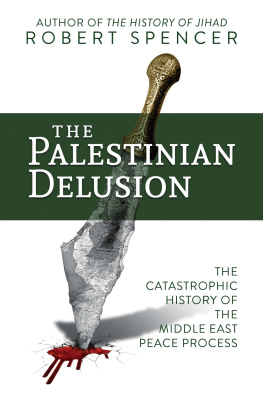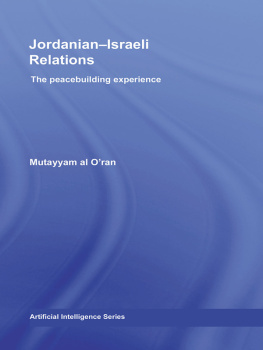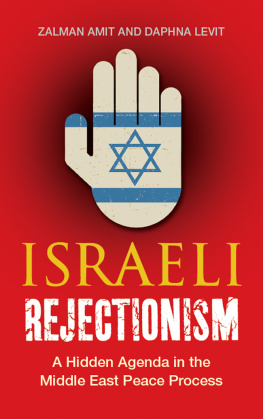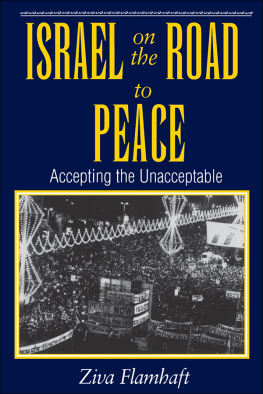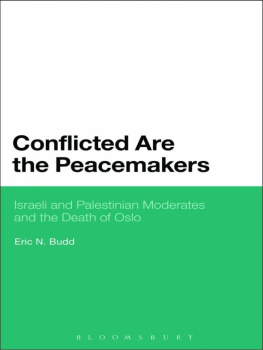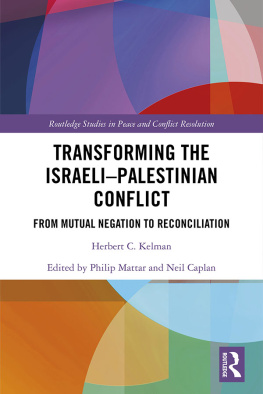This book is a publication of
Indiana University Press
Office of Scholarly Publishing
Herman B Wells Library 350
1320 East 10th Street
Bloomington, Indiana 47405 USA
iupress.indiana.edu
2019 by Indiana University Press
All rights reserved
No part of this book may be reproduced or utilized in any form or by any means, electronic or mechanical, including photocopying and recording, or by any information storage and retrieval system, without permission in writing from the publisher. The paper used in this publication meets the minimum requirements of the American National Standard for Information SciencesPermanence of Paper for Printed Library Materials, ANSI Z39.48-1992.
Manufactured in the United States of America
Library of Congress Cataloging-in-Publication Data
Names: Golan, Galia, editor. | Sher, Gilead, editor.
Title: Spoiling and coping with spoilers : Israeli-Arab negotiations / Galia Golan and Gilead Sher, editors.
Description: Bloomington, Indiana, USA : Indiana University Press, 2019. | Series: Indiana series in Middle East studies | Includes bibliographical references and index.
Identifiers: LCCN 2019011412 (print) | LCCN 2019016210 (ebook) | ISBN 9780253042408 (ebook) | ISBN 9780253042361 | ISBN 9780253042361 hardback : paper) | ISBN 9780253042378pbk. : paper)
Subjects: LCSH: Arab-Israeli conflict1993Peace.
Classification: LCC DS119.76 (ebook) | LCC DS119.76 .S796 2019 (print) | DDC 956.05/4dc23
LC record available at https://lccn.loc.gov/2019011412
1 2 3 4 5 23 22 21 20 19
W E WOULD LIKE TO THANK DEBORAH SHULMAN FOR her devoted, efficient, and wise assistance in preparing this volume, from its inception. As a researcher in the Center for Applied Negotiations of the Institute for National Security Studies (INSS), Deborah was an invaluable resource, as well as a contributing coauthor, and we are most grateful to her. Our thanks also to Mor Ben-Kalifa, who masterfully and graciously completed the many tasks in the final preparation of the book for publication after Deborah moved on from INSS to other work.
We wish also to thank our contributors to this volume. We thank them for their patience and cooperation throughout our many communications, queries, and requests, taking the time from their busy schedules and important work to join us in the examination of this critical topic. We are grateful for the resources and support provided to us by the INSS.
We are hopeful that this international, interdisciplinary, and multifaceted study of spoilers and coping with spoilers will contribute to a normalization of relations between Israel and the Arab world. Within that context, we hope that it will contribute in the future to the successful realization of peace between Israel and the Palestinians.
SPOILING AND COPING WITH SPOILERS
Theoretical Background
There are many obstacles on the path of peacemaking, and many factors contribute to the failure of such efforts, particularly in the case of long-standing armed conflicts. Among the many factors, the acts of spoilers have often figured prominently, perhaps critically, as groups or individuals strive to influence, disrupt, or defeat negotiations or peace-building endeavors. The concept of spoilers in the resolution of conflicts has generally been treated in connection with violent actions taken during peace negotiations or following an agreement, in an effort by one side, or a faction or group on one side or the other, to spoildisrupt or endthe peace effort. Past analyses have occasionally expanded the concept to nonviolent spoilers and potential spoilers, particularly during the period of negotiations or peace processes prior to an agreement. Violent spoiling may produce catastrophic results, but other forms of spoiling can also be critical to the process insofar as they may also disrupt negotiations or even bring them to a halt. The success or failure of nonviolent spoilers depends on a large number of factors, such as the identity and motivation of the spoilers, their influence or strength, the methods they employ, the context or circumstances of their efforts, and the measures adopted by the custodians of the peace process for coping with the spoiling efforts. We shall examine these factors, with attention also to the less-examined matter of coping with nonviolentprimarily politicalspoilers, reviewing examples of past peace processes with a focus on spoiling by Israelis (or their supporters abroad) in connection with Israeli-Arab negotiations.
Israeli spoilers provide an interesting, and, in fact, relatively rare, case of nonviolent spoilers operating in a democratic society (in which there are varied nonviolent methods for expressing opposition) within a broader context of violence. In some cases, for example, the efforts to spoil the peace process with Egypt took place within the broader context of an ongoing conflict that sporadically exploded into armed conflict and war. In other cases, particularly those connected with Israeli-Palestinian negotiations, Israeli spoilers acted within a context of near-constant violent spoiling actions that came from within the ranks of the adversary, namely almost-daily terror attacks by Islamist elements from the Palestinian side. Although ultimately Israeli spoiling became violent with the assassination of Prime Minister Yitzhak Rabin, this fateful act of violence was in fact an isolated case in an increasingly volatile but nonetheless nonviolent process of domestic opposition. While the broader context during any period of the conflict must be borne in mind and may be assumed to have played at least some psychological role for spoilers, our interest is to examine the phenomenon of nonviolent spoiling, in quite varied forms, during different instances of Israeli peace efforts. Such an examination may throw light not only on the specific problem of nonviolent spoilers to Israeli peacemaking and possibly the means of coping with them, but also elucidate the more general topic of nonviolent spoilers and spoiling.
Originally the studies of spoilers focused on the motivation and identity of the spoilers, based on the premise that if one knew the reasons behind the spoilers actions, primarily their goals, one would be better able to cope with them. Steven Stedman, who introduced this area of study, identified three types of spoilers, according to motivation/objectives: limited, greedy, and total (opposition). Moreover, the degree of commitmentto the process or to their own demandsmay well determine if a limited or greedy spoiler will turn into a total spoiler.
The position of all these types of spoilers is of importance. They may be on the same side as one party to the process or they may be among the adversarys camp. In this sense, a two-level game may be needed, namely to persuade not only ones own camp but also spoilers, or potential spoilers, from the adversarys side.
In such cases, the motive for joining (possibly even initiating) the process may, for example, be to counter domestic or international pressure, to gain time to recoup and strengthen positions, to gain political favor from a constituency, or to promote personal political fortunes within a power struggle. Spoilers outside the negotiating process may come from civil society as well as political groupings, including a ruling coalition, and from third parties altogether, such as other countries, diaspora, international organizations, or groups. Two subtypes of spoilers could be added to the list, whether inside or outside the process itself: skeptics and potential spoilers. Skeptics might be inadvertent or unintentional spoilersnamely, limited or greedy spoilers (to use the classic categories) who generally support the process (or, at least are not totally opposed) but who, out of mistrust or strong doubts, make demands that constitute deal breakers.




